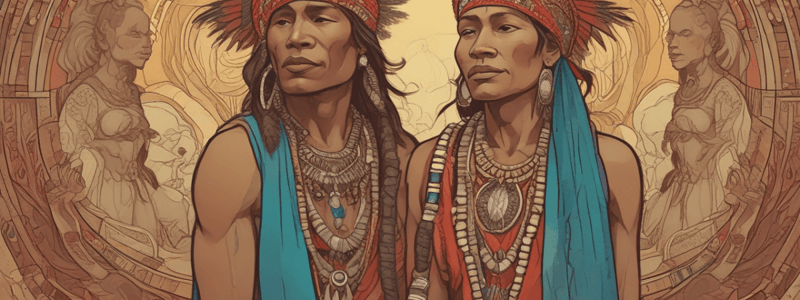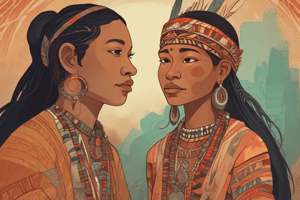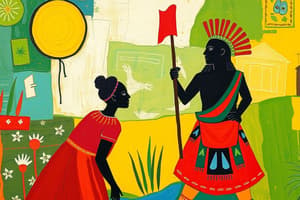Podcast
Questions and Answers
What is the title of the act that recognizes, protects, and promotes the rights of indigenous cultural communities?
What is the title of the act that recognizes, protects, and promotes the rights of indigenous cultural communities?
What is one of the rights of indigenous cultural communities recognized by the State?
What is one of the rights of indigenous cultural communities recognized by the State?
What is the main goal of the State in protecting the rights of indigenous cultural communities?
What is the main goal of the State in protecting the rights of indigenous cultural communities?
What is the term used to refer to indigenous cultural communities in the context of this act?
What is the term used to refer to indigenous cultural communities in the context of this act?
Signup and view all the answers
Which of the following is NOT a provision of the act?
Which of the following is NOT a provision of the act?
Signup and view all the answers
What is the context in which the State recognizes and promotes the rights of indigenous cultural communities?
What is the context in which the State recognizes and promotes the rights of indigenous cultural communities?
Signup and view all the answers
What is the primary condition under which the State shall protect the rights of indigenous cultural communities?
What is the primary condition under which the State shall protect the rights of indigenous cultural communities?
Signup and view all the answers
What is the focus of the economic, social, and cultural well-being ensured by the State's protection of indigenous cultural communities' rights?
What is the focus of the economic, social, and cultural well-being ensured by the State's protection of indigenous cultural communities' rights?
Signup and view all the answers
Which of the following is a resource that is considered non-registrable property?
Which of the following is a resource that is considered non-registrable property?
Signup and view all the answers
What is the relationship between the State's recognition of indigenous cultural communities' rights and national unity?
What is the relationship between the State's recognition of indigenous cultural communities' rights and national unity?
Signup and view all the answers
What is the role of the National Commission on Indigenous Peoples established by this Act?
What is the role of the National Commission on Indigenous Peoples established by this Act?
Signup and view all the answers
What is the year in which this Act was passed?
What is the year in which this Act was passed?
Signup and view all the answers
What is the primary purpose of the State's recognition and protection of indigenous cultural communities' rights?
What is the primary purpose of the State's recognition and protection of indigenous cultural communities' rights?
Signup and view all the answers
What is the status of natural resources within ancestral domains?
What is the status of natural resources within ancestral domains?
Signup and view all the answers
What is the framework within which the State recognizes and promotes the rights of indigenous cultural communities?
What is the framework within which the State recognizes and promotes the rights of indigenous cultural communities?
Signup and view all the answers
What is the focus of the State's protection of indigenous cultural communities' rights to their ancestral lands?
What is the focus of the State's protection of indigenous cultural communities' rights to their ancestral lands?
Signup and view all the answers
What is the relationship between the State's recognition of indigenous cultural communities' rights and national development?
What is the relationship between the State's recognition of indigenous cultural communities' rights and national development?
Signup and view all the answers
What is the basis of the State's protection of indigenous cultural communities' rights to their ancestral lands?
What is the basis of the State's protection of indigenous cultural communities' rights to their ancestral lands?
Signup and view all the answers
What is the main objective of the Indigenous Peoples' Rights Act of 1997?
What is the main objective of the Indigenous Peoples' Rights Act of 1997?
Signup and view all the answers
What is the status of natural resources within ancestral domains?
What is the status of natural resources within ancestral domains?
Signup and view all the answers
What is the role of the State in protecting the rights of indigenous cultural communities?
What is the role of the State in protecting the rights of indigenous cultural communities?
Signup and view all the answers
What is the framework within which the State recognizes and promotes the rights of indigenous cultural communities?
What is the framework within which the State recognizes and promotes the rights of indigenous cultural communities?
Signup and view all the answers
What is the focus of the economic, social, and cultural well-being ensured by the State's protection of indigenous cultural communities' rights?
What is the focus of the economic, social, and cultural well-being ensured by the State's protection of indigenous cultural communities' rights?
Signup and view all the answers
What is the relationship between the State's recognition of indigenous cultural communities' rights and national development?
What is the relationship between the State's recognition of indigenous cultural communities' rights and national development?
Signup and view all the answers
The National Commission on Indigenous Peoples is responsible for implementing the Indigenous Peoples' Rights Act of 1997.
The National Commission on Indigenous Peoples is responsible for implementing the Indigenous Peoples' Rights Act of 1997.
Signup and view all the answers
The State recognizes the rights of indigenous cultural communities to natural resources within their ancestral domains.
The State recognizes the rights of indigenous cultural communities to natural resources within their ancestral domains.
Signup and view all the answers
The Indigenous Peoples' Rights Act of 1997 was passed in 2001.
The Indigenous Peoples' Rights Act of 1997 was passed in 2001.
Signup and view all the answers
The State's protection of indigenous cultural communities' rights is conditional upon their assimilation into national unity.
The State's protection of indigenous cultural communities' rights is conditional upon their assimilation into national unity.
Signup and view all the answers
Indigenous cultural communities have the right to self-determination under the Act.
Indigenous cultural communities have the right to self-determination under the Act.
Signup and view all the answers
The Act is focused on promoting the economic well-being of indigenous cultural communities.
The Act is focused on promoting the economic well-being of indigenous cultural communities.
Signup and view all the answers
The State recognizes and promotes the rights of indigenous cultural communities in the context of national unity and development.
The State recognizes and promotes the rights of indigenous cultural communities in the context of national unity and development.
Signup and view all the answers
Natural resources within ancestral domains are considered registrable property.
Natural resources within ancestral domains are considered registrable property.
Signup and view all the answers
The National Commission on Indigenous Peoples is responsible for implementing the Indigenous Peoples' Rights Act of 1997.
The National Commission on Indigenous Peoples is responsible for implementing the Indigenous Peoples' Rights Act of 1997.
Signup and view all the answers
The Indigenous Peoples' Rights Act of 1997 was passed in 2001.
The Indigenous Peoples' Rights Act of 1997 was passed in 2001.
Signup and view all the answers
The State's protection of indigenous cultural communities' rights is conditional upon their assimilation into national unity.
The State's protection of indigenous cultural communities' rights is conditional upon their assimilation into national unity.
Signup and view all the answers
The Act focuses on promoting the economic well-being of indigenous cultural communities.
The Act focuses on promoting the economic well-being of indigenous cultural communities.
Signup and view all the answers
Republic Act No. 8371 is also known as the _______________ Peoples' Rights Act of 1997.
Republic Act No. 8371 is also known as the _______________ Peoples' Rights Act of 1997.
Signup and view all the answers
The State recognizes and promotes the rights of _______________ cultural communities within the framework of national unity and development.
The State recognizes and promotes the rights of _______________ cultural communities within the framework of national unity and development.
Signup and view all the answers
The State shall protect the rights of _______________ cultural communities to their ancestral lands.
The State shall protect the rights of _______________ cultural communities to their ancestral lands.
Signup and view all the answers
Natural resources within ancestral domains are considered _______________ property.
Natural resources within ancestral domains are considered _______________ property.
Signup and view all the answers
The State's recognition and protection of _______________ cultural communities' rights is conditional upon national unity and development policies and programs.
The State's recognition and protection of _______________ cultural communities' rights is conditional upon national unity and development policies and programs.
Signup and view all the answers
The State recognizes the rights of _______________ cultural communities to their ancestral lands to ensure economic, social and cultural well-being.
The State recognizes the rights of _______________ cultural communities to their ancestral lands to ensure economic, social and cultural well-being.
Signup and view all the answers
Match the following terms with their definitions:
Match the following terms with their definitions:
Signup and view all the answers
Match the following rights with their descriptions:
Match the following rights with their descriptions:
Signup and view all the answers
Match the following phrases with their meanings:
Match the following phrases with their meanings:
Signup and view all the answers
Match the following phrases with their relationships:
Match the following phrases with their relationships:
Signup and view all the answers
Match the following phrases with their purposes:
Match the following phrases with their purposes:
Signup and view all the answers
Match the following phrases with their contexts:
Match the following phrases with their contexts:
Signup and view all the answers
Study Notes
Republic Act No. 8371: The Indigenous Peoples' Rights Act of 1997
- Recognizes, protects, and promotes the rights of Indigenous Cultural Communities (ICCs) and Indigenous Peoples
- Creates a National Commission on Indigenous Peoples
- Establishes implementing mechanisms and appropriates funds for the Act
Ancestral Domains
- Non-registrable property includes natural resources within ancestral domains
- Ancestral domains are areas of land that have been traditionally occupied by Indigenous Cultural Communities
Rights of Indigenous Cultural Communities
- The State recognizes and promotes the rights of ICCs within the framework of national unity and development
- The State is committed to protect the rights of ICCs to their ancestral lands, ensuring economic, social, and cultural well-being
- This protection is subject to the provisions of the Constitution and national development policies and programs
Republic Act No. 8371: The Indigenous Peoples' Rights Act of 1997
- Recognizes, protects, and promotes the rights of Indigenous Cultural Communities (ICCs) and Indigenous Peoples
- Creates a National Commission on Indigenous Peoples
- Establishes implementing mechanisms and appropriates funds for the Act
Ancestral Domains
- Non-registrable property includes natural resources within ancestral domains
- Ancestral domains are areas of land that have been traditionally occupied by Indigenous Cultural Communities
Rights of Indigenous Cultural Communities
- The State recognizes and promotes the rights of ICCs within the framework of national unity and development
- The State is committed to protect the rights of ICCs to their ancestral lands, ensuring economic, social, and cultural well-being
- This protection is subject to the provisions of the Constitution and national development policies and programs
Republic Act No. 8371: The Indigenous Peoples' Rights Act of 1997
- Recognizes, protects, and promotes the rights of Indigenous Cultural Communities (ICCs) and Indigenous Peoples
- Creates a National Commission on Indigenous Peoples
- Establishes implementing mechanisms and appropriates funds for the Act
Ancestral Domains
- Non-registrable property includes natural resources within ancestral domains
- Ancestral domains are areas of land that have been traditionally occupied by Indigenous Cultural Communities
Rights of Indigenous Cultural Communities
- The State recognizes and promotes the rights of ICCs within the framework of national unity and development
- The State is committed to protect the rights of ICCs to their ancestral lands, ensuring economic, social, and cultural well-being
- This protection is subject to the provisions of the Constitution and national development policies and programs
Republic Act No. 8371: The Indigenous Peoples' Rights Act of 1997
- Recognizes, protects, and promotes the rights of Indigenous Cultural Communities (ICCs) and Indigenous Peoples
- Creates a National Commission on Indigenous Peoples
- Establishes implementing mechanisms and appropriates funds for the Act
Ancestral Domains
- Non-registrable property includes natural resources within ancestral domains
- Ancestral domains are areas of land that have been traditionally occupied by Indigenous Cultural Communities
Rights of Indigenous Cultural Communities
- The State recognizes and promotes the rights of ICCs within the framework of national unity and development
- The State is committed to protect the rights of ICCs to their ancestral lands, ensuring economic, social, and cultural well-being
- This protection is subject to the provisions of the Constitution and national development policies and programs
Republic Act No. 8371: The Indigenous Peoples' Rights Act of 1997
- Recognizes, protects, and promotes the rights of Indigenous Cultural Communities (ICCs) and Indigenous Peoples
- Creates a National Commission on Indigenous Peoples
- Establishes implementing mechanisms and appropriates funds for the Act
Ancestral Domains
- Non-registrable property includes natural resources within ancestral domains
- Ancestral domains are areas of land that have been traditionally occupied by Indigenous Cultural Communities
Rights of Indigenous Cultural Communities
- The State recognizes and promotes the rights of ICCs within the framework of national unity and development
- The State is committed to protect the rights of ICCs to their ancestral lands, ensuring economic, social, and cultural well-being
- This protection is subject to the provisions of the Constitution and national development policies and programs
Republic Act No. 8371: The Indigenous Peoples' Rights Act of 1997
- Recognizes, protects, and promotes the rights of Indigenous Cultural Communities (ICCs) and Indigenous Peoples
- Creates a National Commission on Indigenous Peoples
- Establishes implementing mechanisms and appropriates funds for the Act
Ancestral Domains
- Non-registrable property includes natural resources within ancestral domains
- Ancestral domains are areas of land that have been traditionally occupied by Indigenous Cultural Communities
Rights of Indigenous Cultural Communities
- The State recognizes and promotes the rights of ICCs within the framework of national unity and development
- The State is committed to protect the rights of ICCs to their ancestral lands, ensuring economic, social, and cultural well-being
- This protection is subject to the provisions of the Constitution and national development policies and programs
Republic Act No. 8371: The Indigenous Peoples' Rights Act of 1997
- Recognizes, protects, and promotes the rights of Indigenous Cultural Communities (ICCs) and Indigenous Peoples
- Creates a National Commission on Indigenous Peoples
- Establishes implementing mechanisms and appropriates funds for the Act
Ancestral Domains
- Non-registrable property includes natural resources within ancestral domains
- Ancestral domains are areas of land that have been traditionally occupied by Indigenous Cultural Communities
Rights of Indigenous Cultural Communities
- The State recognizes and promotes the rights of ICCs within the framework of national unity and development
- The State is committed to protect the rights of ICCs to their ancestral lands, ensuring economic, social, and cultural well-being
- This protection is subject to the provisions of the Constitution and national development policies and programs
Republic Act No. 8371: The Indigenous Peoples' Rights Act of 1997
- Recognizes, protects, and promotes the rights of Indigenous Cultural Communities (ICCs) and Indigenous Peoples
- Creates a National Commission on Indigenous Peoples
- Establishes implementing mechanisms and appropriates funds for the Act
Ancestral Domains
- Non-registrable property includes natural resources within ancestral domains
- Ancestral domains are areas of land that have been traditionally occupied by Indigenous Cultural Communities
Rights of Indigenous Cultural Communities
- The State recognizes and promotes the rights of ICCs within the framework of national unity and development
- The State is committed to protect the rights of ICCs to their ancestral lands, ensuring economic, social, and cultural well-being
- This protection is subject to the provisions of the Constitution and national development policies and programs
Studying That Suits You
Use AI to generate personalized quizzes and flashcards to suit your learning preferences.
Related Documents
Description
This quiz is about the Republic Act No. 8371, also known as the Indigenous Peoples' Rights Act of 1997. It aims to recognize, protect, and promote the rights of indigenous cultural communities. Learn about the act's provisions and implementing mechanisms.




